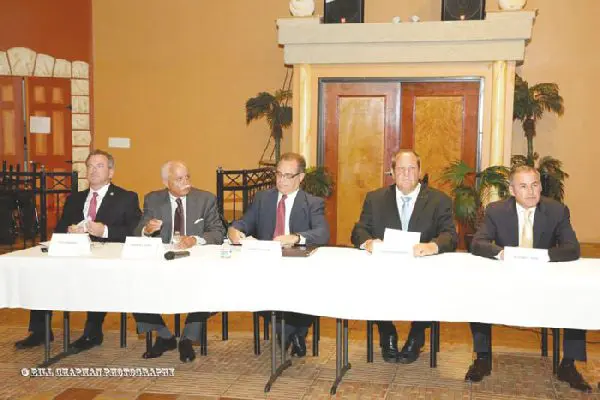
|
| L-R: Candidates Cavanaugh, Evans, Ficano, McNamara and Wild. PHOTO: BILL CHAPMAN |
DEARBORN — On Tuesday, July 8, the five leading candidates in the Wayne County executive race reaffirmed their commitment to diversity and presented their respective cases for why they should be elected, at a forum organized by the Arab American Political Action Committee at the Lebanese American Heritage Club.
State Representative and former Wayne County Commissioner Phil Cavanagh; former Wayne County Sheriff Warren Evans; incumbent Robert Ficano; Wayne County Commissioner Kevin McNamara; and Westland Mayor William (Bill) Wild answered questions from AAPAC and the audience.
All five candidates are democrats. They will square off in the August 5 primary, which will likely decide the next executive in the overwhelmingly democratic county.
About 150 people, including community leaders and elected officials, attended the forum. AAPAC treasurer Mariam Bazzi moderated the debate, which began with candidate introductions and opening remarks.
Cavanagh, the son of former Detroit Mayor Jerome Cavanagh, said his grandfather worked at the Ford Rouge plant in Dearborn and raised five kids.
“This is a democratic primary,” Cavanagh said. “It is about family values. It is about labor. It is about working class people and I’m running for Wayne County executive because I believe we’ve lost focus of that. It’s become for the entitled and the well-connected; and I want to take this down to the family level.”
Evans promised to “change the paradigm” of Wayne County by working collaboratively with other regional leaders and local communities if elected. “We have to start working together to pull this region in the right direction,” he said.
Ficano said he has been committed to diversity and inclusion by including qualified Arab Americans and other ethnic groups.
“The Arab American community has no greater friend than Robert Ficano,” said the county executive.
McNamara, son of former county executive Ed McNamara, took a jibe at Ficano—his father’s successor–in his introductory remarks, saying that the current executive did bring diversity to the county, but “transparency, we’re working on it.”
The commissioner said he has earned the endorsements of 150 local elected officials.
“We want to rebuild Wayne County,” he said. “We want to rebuild for the communities, where they want it to be rebuilt. We’re going to ask the communities what services they want. We’re not going to decide them for them.”
Wild said Westland is the only city in the county that has a three-year balanced budget.
“I’m also a business owner,” he said. “That’s why I talk a little different than some of the other guys. I’ve been a business owner for all of my adult life. I’m also the only person at this table who effectively runs local government.”
AAPAC asked the candidates about their plan to address the deficit in the county budget. Ficano bought up his deficit reduction plan as the solution, while the other candidates suggested increased transparency and efficiency.
“We have a $170 million accumulated deficit and $30 to $40 million structural deficit,” said Cavanagh. “The first step is transparency. We don’t know how many appointees are over there. My goal is to put everything on the line, including all the appointees and what their salaries are. The other thing is how to manage the money. I’ve said many times that our criminal justice system is not properly funded. The cuts are based on your political friends.”
He added that balancing the budget will take leadership, cooperation with the board of commissioners, and “tough decisions.”
Evans echoed Cavanagh’s comments on transparency.
“The other thing is in every government and every household in America, you have nice-to-do stuff, and you have must-do stuff,” he said. “When times are tough, you pull away the nice-to-do stuff and you do the must-do things. Wayne County has yet to do that.”
He said sacrifices must begin at the top to convince others to collaborate; and that the county’s finances have to be run “like a business.”
Ficano said talks of a state-appointed emergency manager have faded away from the media because of the deficit reduction plan that was passed by the county commissioners and approved by the state in May.
“As for transparency, Wayne County has the highest transparent website that was given an award in the State of Michigan,” he said. “We have the highest rating in Michigan of any county. We have given from the beginning. I’ve taken a 10 percent cut for the past five years, so did everybody who works with me at will. The plan is going to work.”
McNamara said he voted against the deficit elimination plan, which passed the commission in an 8- 6 vote, because it transfers the burden of the county’s $120 million to 13 local communities, including Dearborn.
“My system is based on history,” he said. “In the 60’s we had this problem and the state was going to shut us down, but we rebuilt the county. And then in the 80’s, they were going to shut us down, but we rebuilt the county. My system is to bring communities to get them involved… At the end of the day, we need to find out what services we are going to keep and what services we are going to get rid of. And there are a couple [of services] that local officials wants us out of.”
Wild, the last candidate to address the budget issue at the forum, asked Bazzi to repeat the question.
“Here’s the reason I asked you to repeat the question, because I heard four people talk, two minutes apiece, but not one single person said what we’re going to do to address the budget,” said the Westland mayor. “We’ve got to do the same thing we did in the city of Westland. You’ve got to bring your expenses in line with your revenues.”
Wild said he instilled a shared sense of sacrifice and worked with the unions to reduce costs by starting the cuts at the top with his own appointees. He said he saved Westland $1 million by cutting six appointees; and he intends to bring that logic to the county, where the executive has 150 to 200 appointees.
Candidates were asked how they would combat corruption in the county, after several county employees were charged with corruption over the past few years.
Wild said every single resident in the county knows about the scandals, corruption and the FBI investigation of county contracts. He said he plans to bring open, transparent government back to Wayne County with his plan “Ethics 2.0.”
“In my first day in office, we’re going to appoint a full-time ethics officer, who will work not only with the appointees, but also with the employees,” Wild said. He explained that the ethics officer would ensure that everybody knows the right way to work.
McNamara praised Wild’s idea, adding that bringing in an independent judge who is not appointed [by anyone in the county] to uphold the ethics code also helps. “We’ve already done this. It’s not going to happen again,” he said referring to the independent ethics board at the county level.
Ficano said his appointees who were involved in corruption betrayed him. “Everybody in one way or another has faced betrayal, whether it’s from a friend, a colleague or even a spouse,” he said. “It’s how you react to it that makes the difference. What I’ve done is that in these couple of instances, the people in question were separated from the administration or fired.”

|
| Mariam Bazzi. |
The county executive said he also helped set up the ethics board and brought in former U.S. attorney for the Eastern District of Michigan Jeff Collins as his deputy to help end corruption.
Evans said he strongly disagrees with Ficano’s outlook.
“There’s a big difference between being reactive and proactive,” Evans said. “What you do is proactively lead from the front, watch your organization, set goals and have people work towards them, and you won’t have those problems. “I’ve been in public service as long as the current executive and I’ve never had anybody near me indicted or under investigation. And the reason is that you lead from the front and you don’t tolerate that kind of behavior.”
Cavanagh said he would do away with the culture that breeds corruption at the county level.
“It is about changing the entire culture of patronage and campaign promises, et cetera,” he said. “I watched a lot of people in my eight years as county commissioner just skyrocket to the top and I watched them being appointed.”
Asked about diversity, all candidates said they are committed to inclusion. Wild said he appointed an Arab American as the head of the Westland department of public works last month.
Ficano responded by saying he “walked the walk” when it comes to diversifying the county and stood up with Arab Americans, not just hired one Arab a few months before the elections.
Evans said inclusion is a sound business decision, because it enlarges the pool of talent at work.
The tempo of the debate increased when candidates started directing their answers toward each other. In one instance, an audience member asked Wild if he is a republican.
The Westland mayor said he has been a registered democrat since 2007 and had no partisan affiliation prior to that, adding that the question must have been instructed by one of the candidates.
“When you stop telling lies about me, I’ll stop telling the truth about you,” he told the four candidates at the table, while standing.
AAPAC Vice-President Zenna Elhasan called the forum a success. “It was very informative and productive. We got a good sense of what each candidate stands for,” she said. “The audience was receptive and representative of the community.”






Leave a Reply